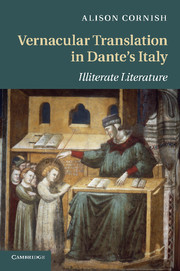Book contents
- Frontmatter
- Contents
- Acknowledgements
- Introduction
- 1 Dressing down the muses: the anxiety of volgarizzamento
- 2 The authorship of readers
- 3 Cultural ricochet: French to Italian and back again
- 4 Translation as miracle: illiterate learning and religious translation
- 5 The treasure of the translator: Dante and Brunetto
- 6 A new life for translation: volgarizzamento after humanism
- Notes
- Bibliography
- Index
- CAMBRIDGE STUDIES IN MEDIEVAL LITERATURE
6 - A new life for translation: volgarizzamento after humanism
Published online by Cambridge University Press: 04 February 2011
- Frontmatter
- Contents
- Acknowledgements
- Introduction
- 1 Dressing down the muses: the anxiety of volgarizzamento
- 2 The authorship of readers
- 3 Cultural ricochet: French to Italian and back again
- 4 Translation as miracle: illiterate learning and religious translation
- 5 The treasure of the translator: Dante and Brunetto
- 6 A new life for translation: volgarizzamento after humanism
- Notes
- Bibliography
- Index
- CAMBRIDGE STUDIES IN MEDIEVAL LITERATURE
Summary
Dante's critique of volgarizzamento had no immediate effect, and the Divine Comedy, as Dante probably anticipated, did not survive long without commentary and even translation. Andrea Lancia made his vernacular version of a Latin compendium of the Aeneid at the behest of Coppo di Borghese before Dante died (c.1316). One of the most prolific of translators in the early Trecento and long thought to be the author of the so-called Ottimo commento, Lancia has now been shown to be the transcriber of marginal glosses to the Commedia in which he both translates and paraphrases other texts himself and makes use of available volgarizzamenti. The Ottimo commentary on the Commedia also makes frequent use of contemporary translations. Dante's prestige had already become such within his own lifetime that he is regularly cited as an authority in vernacular translations of and commentary on the ancient auctores. For example, glosses to the Tuscan Rimedi d'amore (with which Lancia is also connected) equate Ovid's noble audience with Dante's ‘amor ch'al cor gentil ratto s'aprende’. Ciampòlo di Meo degli Ugurgieri's complete Eneide, which made use of or was used for Andrea Lancia's shorter version, thick with marginal and interlinear glosses, makes ample reference to passages in Inferno and Purgatorio.
- Type
- Chapter
- Information
- Vernacular Translation in Dante's ItalyIlliterate Literature, pp. 158 - 179Publisher: Cambridge University PressPrint publication year: 2010



